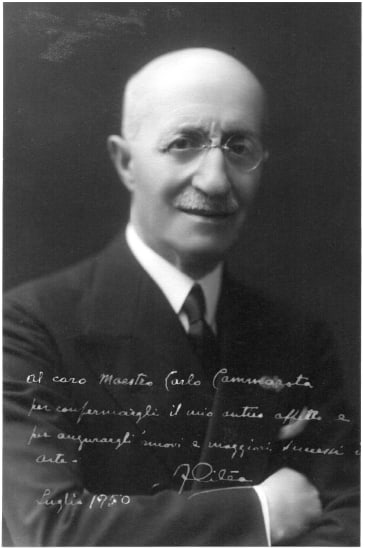Prices
Show / Event
Venue
Experience
No result. Clear filters or select a larger calendar range.
No show today.
Francesco Cilea
Composer

Biography
Francesco Cilea was born in Palmi, a small town in Calabria, Italy, on 23 July 1866. Born into an upper middle-class family, he took his first piano lessons with his father, an amateur musician. At 7, he left Calabria for Naples. He attended one of the most famous schools in the Italian peninsula, the Royal Conservatory of San Pietro a Maiella, where he was noticed by Francesco Florimo, friend and biographer of Vincenzo Bellini. He conducted the school’s orchestra and choruses, which granted him free access to all the performances set at Teatro San Carlo.
This was at this time that he composed his first pieces, including a Trio for piano, violin and cello (1886), an Orchestral Suite (1887), a Sonata for piano and cello (1888). He took part in a competition for a chair of harmony and the committee commissioned him to write an opera for the small theatre of the Conservatoire, Gina, which premiered on 9 February 1889 and received rather good reviews. Having graduated, Cilea searched for a new opera theme. In the meantime, Mascagni's Cavalleria rusticana revolutionised musical theatre: verismo opera was born. He was commissioned to write a new opera by a publisher, Edoardo Sonzogno, Tilda, which premiered at Teatro Pagliano (today Teatro Verdi) in Florence on 7 April 1892.
The work was a resounding success and even toured in Vienna where the famous music critic Eduard Hanslick praised Cilea's style and orchestration. The composer started to work on his Arlésienne, created at Teatro Lirico, Milan, on 27 November 1897, with Enrico Caruso starring as Federico. Strangely enough, the piece only achieved polite success. Wishing to abandon the theatre, Cilea accepted the chair of harmony at the Musical Institute in Florence. But he soon returned to composition and found his new subject in a play by Eugène Scribe and Ernest Legouvé. Adriana Lecouvreur’s triumph was such that the opera quickly toured throughout the world, to unanimous critical acclaim. Cilea considered writing a new work, Francesca da Rimini, and even met with Gabriele d’Annunzio. But the project never took off. Cilea's career as an opera composer came to an end with the failure of Gloria, premiered on 15 February 1907 at La Scala in Milan - though he wrote one last opera, Il matrimonio selvaggio (1909), which was never released. In 1913, Cilea took over the direction of the Bellini Conservatory in Palermo, before returning three years later to lead his former school, the San Pietro a Maiella Conservatory in Naples. He remained there for twenty years, alternating teaching activities with the composition of small pieces for piano or orchestra. Appointed to the Italian Academy on 14 April 1939, he died on 20 November 1950 in Varazze.













